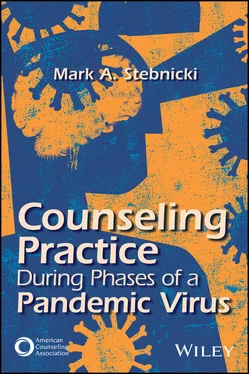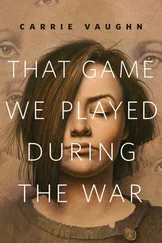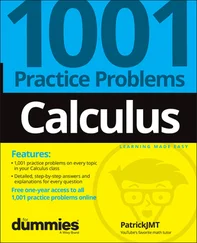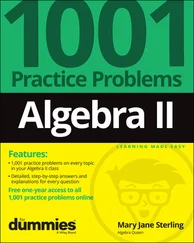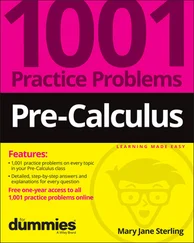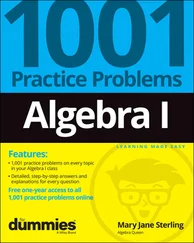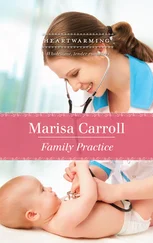1 Cover
2 Title Page Mark A. Stebnicki
3 Copyright Page Copyright © 2021 by the American Counseling Association. All rights reserved. Printed in the United States of America. Except as permitted under the United States Copyright Act of 1976, no part of this publication may be reproduced or distributed in any form or by any means, or stored in a database or retrieval system, without the written permission of the publisher. American Counseling Association 6101 Stevenson Avenue, Suite 600 Alexandria, VA 22304 Associate Publisher • Carolyn C. Baker Digital and Print Development Editor • Nancy Driver Production Manager • Bonny E. Gaston Copy Editor • Beth Ciha Cover and text design by Bonny E. Gaston Library of Congress Cataloging-in-Publication Data Names: Stebnicki, Mark A., author. Title: Counseling practice during phases of a pandemic virus / Mark A. Stebnicki, Ph.D., LCMHC, DCMHS, CRC, CMCC. Description: Alexandria, VA : American Counseling Association, [2021] | Includes bibliographical references and index. Identifiers: LCCN 2021008083 | ISBN 9781556204081 (paperback) Subjects: LCSH: Disaster victims—Mental health. | Disasters— Psychological aspects. | Psychic trauma. | COVID-19 (Disease) Classification: LCC RC451.4.D57 S74 2021 | DDC 363.34/8—dc23 LC record available at https://lccn.loc.gov/2021008083
4 Dedication Page
5 Acknowledgments Acknowledgments I want to offer my sincerest gratitude to the following individuals who reviewed the work I created for my pandemic risk and resiliency continuum theoretical model and to those who submitted a “Pandemic Perspective” for this book. I invited a review and comment from a panel of individuals who had expertise in the areas of disaster mental health and trauma counseling, counselor education, behavioral sciences, epidemiology, and public health and those who have worked with the medical, psychosocial, and vocational aspects of chronic illness and disability. I requested their critical review because of the respect I have for their impressive careers and body of work, which assisted me in developing a stronger book. Stephanie F. Dailey, EdD, LPC, NCC, ACS Assistant Professor, Counseling and Development George Mason University Donna R. Falvo, PhD Professor (Ret.) Mary Switzer Scholar Clinical Psychologist, Registered Nurse (Ret.) Southern Illinois University–Carbondale University of North Carolina–Chapel Hill Debra A. Harley, PhD, CRC, LPC Provost’s Distinguished Service Professor Early Childhood, Special Education, and Rehabilitation Counseling University of Kentucky Michael E. King, PhD, MSW Captain, U.S. Public Health Service Regional 4 Administrator, Substance Abuse and Mental Health Services Administration Atlanta, Georgia Hanoch Livneh, PhD Professor (Ret.), Counselor Education Program Portland State University Karen Pell, PhD, CVE Applied Social Scientist Columbia, Maryland Tyra Turner Whittaker, RhD, LCMHC, CRC Professor, Department of Counselor Education and Family Studies Liberty University Noel A. Ysasi Jr., PhD, CRC Assistant Professor, Director of PhD Program Department of Addictions and Rehabilitation Services East Carolina University • • •
6 About the Author
7 Introduction At War With a Pandemic Virus Will There Be an End to the Coronavirus Pandemic? A Pandemic Virus and a Mental Health Crisis The New Anthem for Counseling Practice During a Pandemic Virus Foundational Principles of a Pandemic Virus
8 Chapter 1: Theoretical Aspects of Risk and Resiliency During a Pandemic Virus Shortcomings in Theories of Pandemic Disaster Mental Health Response Coping, Risk, and Resiliency as They Apply to the PRRC Theoretical Model Mental, Behavioral, Psychosocial, Medical/Physical Health as They Apply to the PRRC Theoretical Model Theoretical Assumptions of the PRRC Model Concluding Remarks
9 Chapter 2: The Pandemic Risk and Resiliency Continuum Theoretical Model The PRRC Model: Resiliency The PRRC Model: Risk Concluding Remarks
10 Chapter 3: What Is Healthy-Normal and Unhealthy-Abnormal Mental Health Functioning During a Pandemic Virus? The Perception and Experience of Trauma: An Illustration From Military Culture Healthy-Normal and Unhealthy-Abnormal Mental Health: Getting Back to Balance The New Anthem for Mental Health: What Is Healthy and Unhealthy? Evaluating Normal-Healthy and Abnormal-Unhealthy Factors Concluding Remarks
11 Chapter 4: The Medical Aspects of a Pandemic Virus COVID-19 and Other Infectious Diseases Health Disparities Among African Americans and Other Minorities Concluding Remarks
12 Chapter 5: The Psychosocial Aspects of a Pandemic Virus Psychosocial Aspects of Surviving a Pandemic Social Stigma and a Pandemic Virus Mind-Body Connections in Immune Functioning Building a Resilient Immune System Losses Associated With a Pandemic Virus The Impact of COVID-19 on Occupations and Careers Building Career Resiliency Throughout the Phases of a Pandemic Personal Life Story: Pandemic Perspectives Concluding Remarks
13 Chapter 6: Fear and Anxiety: Predominant Emotions During a Pandemic Virus The Mind-Body Connection in Fear and Anxiety Clinical Aspects of Fear and Anxiety The Experience of Fear and Anxiety in a Pandemic Virus Concluding Remarks
14 Chapter 7: Mental Health Aspects of a Pandemic Virus The Event Horizon: Americans on the Brink of Disaster Reexamining Mental Health Issues During the COVID-19 Pandemic Disaster The Psychological Effects of Quarantine and Social Isolation Healing at a Distance and During the COVID Pandemic Mental Health Tipping Points During a Pandemic Virus Adaptation and Adjustment: Stages of a Pandemic Virus Concluding Remarks
15 Chapter 8: Disaster Mental Health Counseling During Phases of a Pandemic Virus: The Phases of Pandemic Rehabilitation Model Mental Health Preparedness During Phases of a Pandemic Virus Unchartered Waters in Public Health Transitioning Through Phases of a Pandemic Virus: The PPR Model The PPR Model Concluding Remarks
16 Chapter 9: Pandemic Risk and Resiliency Factors in Children and Adolescents: Considerations for School Counselors Children and Adolescents as Primary and Secondary Survivors Family Dynamics Among the COVID Generation Children and Adolescents as a Vulnerable, At-Risk Group The COVID Generation and Academic Performance in 2020–2021 Reopening Schools During Phases of a Pandemic Virus Talking to Children and Adolescents About Their Stress, Fears, and Anxieties Guidelines for Improving Resiliency Concluding Remarks
17 Chapter 10: Identifying Risk and Resiliency in Adults During Phases of a Pandemic Virus Disaster Mental Health Response in the COVID Generation Psychiatric Risk Factors and Symptoms Experienced During a Pandemic Virus Making Meaning and Cultivating Resiliency During Phases of a Pandemic Virus Concluding Remarks
18 Chapter 11: A New Anthem for Coping With Extraordinary Stressful and Traumatic Experiences During Phases of a Pandemic Virus The Psychological Response to COVID-19 Coping With Adversity and Cultivating Resiliency During Phases of a Pandemic Virus Concluding Remarks
19 Chapter 12: How Do Cultures and Vulnerable Populations Heal During a Pandemic Virus? The Cultural Intake Interview The Soul Wounding of Americans: Cultivating a New Therapeutic Alliance Concluding Remarks
20 Chapter 13: Guidelines for Coping With Stress, Fear, and Anxiety During Phases of a Pandemic Virus What Should I Be Feeling Right Now? The Threat of a Pandemic Virus Is Everywhere—How Can I Avoid Being Stressed? Why Do I Have Fears About My Future? How Can I Cultivate Coping and Resiliency Skills During a Pandemic Virus? Concluding Remarks
21 Chapter 14: Empathy Fatigue During a Pandemic How Does Empathy Fatigue Differ From Other Impairments in the Helping Profession? Spiritual Aspects of Empathy Fatigue Empathy as the Heart of the Helping Profession Empathy Fatigue Risk Factors and the Global Assessment of Empathy Fatigue Cultivating Counselor Resiliency Concluding Remarks
Читать дальше
